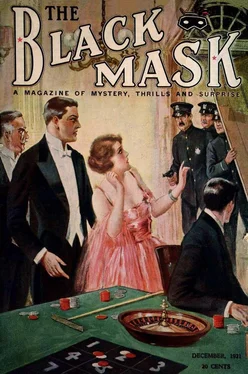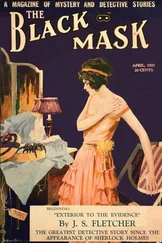Meredith Beyers - The Black Mask Magazine (Vol. 4, No. 3 — December 1921)
Здесь есть возможность читать онлайн «Meredith Beyers - The Black Mask Magazine (Vol. 4, No. 3 — December 1921)» весь текст электронной книги совершенно бесплатно (целиком полную версию без сокращений). В некоторых случаях можно слушать аудио, скачать через торрент в формате fb2 и присутствует краткое содержание. Город: New York, Год выпуска: 1921, Издательство: Pro-distributors Publishing Company, Жанр: Классический детектив, на английском языке. Описание произведения, (предисловие) а так же отзывы посетителей доступны на портале библиотеки ЛибКат.
- Название:The Black Mask Magazine (Vol. 4, No. 3 — December 1921)
- Автор:
- Издательство:Pro-distributors Publishing Company
- Жанр:
- Год:1921
- Город:New York
- ISBN:нет данных
- Рейтинг книги:3 / 5. Голосов: 1
-
Избранное:Добавить в избранное
- Отзывы:
-
Ваша оценка:
- 60
- 1
- 2
- 3
- 4
- 5
The Black Mask Magazine (Vol. 4, No. 3 — December 1921): краткое содержание, описание и аннотация
Предлагаем к чтению аннотацию, описание, краткое содержание или предисловие (зависит от того, что написал сам автор книги «The Black Mask Magazine (Vol. 4, No. 3 — December 1921)»). Если вы не нашли необходимую информацию о книге — напишите в комментариях, мы постараемся отыскать её.
The Black Mask Magazine (Vol. 4, No. 3 — December 1921) — читать онлайн бесплатно полную книгу (весь текст) целиком
Ниже представлен текст книги, разбитый по страницам. Система сохранения места последней прочитанной страницы, позволяет с удобством читать онлайн бесплатно книгу «The Black Mask Magazine (Vol. 4, No. 3 — December 1921)», без необходимости каждый раз заново искать на чём Вы остановились. Поставьте закладку, и сможете в любой момент перейти на страницу, на которой закончили чтение.
Интервал:
Закладка:
He had become much thinner, more haggard, the physician’s swiftly appraising glance told him, as he took his dry, skinny hand in greeting. The eyes seemed to have retreated deep into their bony sockets, and were now magnified by thick tone lenses. The man’s bare feet were thrust into sandals, and he wore a light, loosely belted linen robe falling to his knees. He took Arbuthnot’s hat and indicated an easy chair.
The room was evidently Slade’s general living quarters. It was large, square, lighted on two sides by windows. Its utter lack of the atmosphere of the conventional bachelor’s “den” struck Arbuthnot at once: There were no hospitable glasses, or tea-things, nor so much as a pipe rack or ash tray. The place was as ascetic as a monk’s cell; an effect heightened by Slade’s girdled robe and the sandals. Books — ranks and columns of them — in built-in cases along three sides of the wall. A great flat table, with reading lamp and precise stacks of papers, a rack of sharpened pencils, an open volume with fresh marginal annotations. A wide couch bed at one end, its blankets neatly folded. Filing cases at its head and foot. Through a half-open door Arbuthnot glimpsed the famous laboratory — mostly a gleam of white enamel, against which glimmered the blue-green of retorts and the glitter of polished brass.
Slade seated himself.
“Do you believe that suicide is ever justifiable, Arbuthnot?”
The physician started.
“Certainly not!”
Slade laughed.
“Old inhibitions, doctor! First, your Hippocratian oath — which was never composed by Hippocrates, and is a jumble of pompous platitudes. Then, your religion. We mustn’t take life — because that power is the only one we hold in common with God. Therefore — God is jealous!”
Arbuthnot scanned the face before him, scored deeply with the lines of insomnia, strangely illuminated with the vast mental energy going on within. Everything at top speed, — he thought without replying. Blood pressure too high, of course. Pulse rapid and wiry — you could catch its flutter over the hollow temples. Breathing short — and stirring only the upper chest. Burn out pretty fast, at this rate...
“I told you what my trouble was,” Slade continued in his tired voice. “I know too much. And I know more now than on that day when I consulted you. Oh, very much more!”
Still the alienist uttered no comment. Let the poor devil talk. It was a relief — sort of safety-valve.
“The fact is, I know so much that I am a menace to God Almighty! One of us — so it seems to me — must go. And you sit there, smugly, and tell me that suicide is wrong. As one would tell a naughty child not to bite its nails.”
Slade closed his eyes for a moment and inhaled a deep breath. Then he pulled open a drawer in his table and held out a little oblong glass slide.
“Bits of protoplasm, Arbuthnot. Life cells. And all the scientists in the world, with their most cunning microscopes and reagents, cannot isolate one of them and say whether it would have developed into a rear-admiral or a cucumber; an elephant or a moth; a theologian or a toadstool! Am I right?”
The physician half smiled.
“With certain reservations you are perfectly correct,” he admitted.
“One step separates me from divinity,” Slade remarked. “I haven’t yet actually created a life cell, but I stand on the threshold. And then — what?”
“Many have stood on the threshold a long time, Slade. With the eggs of seaurchins and—”
“Grammar school stuff! Piffle!! I tell you, in less than a year, probably within three months, I can from inorganic substances form a living cell. Then, having the power of creating and destroying life, I shall emerge, the lone pioneer, the first human being to rise to godship. And I don’t dare. I tell you, I am afraid! What of? I don’t know. Not of anything that can happen to this wreck of a body. Not of any hell-and-damnation stuff. Not of pure annihilation. But I am horribly afraid — of something . So much so that I am withholding my foot just as I lift it to take that final step that divides men and gods.”
“I think you are perfectly right,” Arbuthnot assented in soothing tones. “I’d feel the same way about it myself!”
Slade stared at him for a moment before his yellow face broke into a myriad of little wrinkles, and his voice into cracked laughter.
“You’re only a little fellow in your profession, after all! You think I’m demented — even now you’re figuring on how to keep me quiet till you can get a message to the Psychopathic Hospital.”
The alienist went mottled-red. It was precisely what he was thinking — but he was a man of great dignity, and hated to be mocked even by a lunatic.
“You’ve no right to say that,” he parried. “I simply agreed with you.”
“Well — even alienists know enough not to contradict their patients, don’t they? You didn’t dispute that chap when he told you he had a glass heart! Humor us, my learned friend. Humor us!”
Instantly dropping his banter, he leaned forward, his voice falling to a whisper.
“What would you say if I told you that I could take any life cell and make of it what I choose? What are the determining factors? Light — heat — moisture — food — what we term in general, environment.”
He touched a thick, leather-bound book on the table.
“Here are the formulae, all worked out. What will you, my good Arbuthnot? An oak tree, or a lizard? A pretty girl, or a serpent — or, if you like, both in one?”
He rose jerkily, and beckoned his visitor to follow him into the other room.
Arbuthnot, now thoroughly on his guard against any sudden violence directed by Slade against either of them, followed him into a room twice as long as the other, and fitted up as a laboratory.
Even in his anxiety, the extraordinary neatness and order of the room caught his notice. There was none of the litter familiar to such places presided over by man, with only vestigial housekeeping instincts. Brass and nickel were gleaming. Test tubes, glass jars, stood in racks or on shelves. Rows of labeled bottles were not sticky or stained by escaping drops of their own contents. Tables, floor, walls, showed no trace of dust or grime. A tall three-leaved screen cut off one end of the long room, which was lighted from a sky-light, it being too early to turn on any of the numerous incandescents.
Slade crossed over to where, apparently, a huge steel safe was set in the wall, and opened the thick door. It swung easily and noiselessly upon its oiled pinions, revealing a closet the height of a tall man, with a perforated disc upon the floor, and a grill of shining rods extending to the top. Overhead was an oblong box thickly wound with heavy copper wire. A number of dials, indicators and gauges were attached to a heavy plate screwed to the inside of the door. Slade turned to the silent physician.
“This is my lethal chamber,” he explained. “One who enters this steel chest and throws this switch, ceases to exist. He disappears. More scientifically, since in our universe nothing can be destroyed, he is transmuted into material not identifiable by our imperfect senses. Simply open the door five minutes after I enter, and you will see. Or rather, you will not see!”
Arbuthnot made an involuntary step toward the other, who smiled and closed the heavy door.
“Do not be alarmed! I have other things to show you.”
He pointed out a few of the ingenious contrivances in the laboratory, calling especial attention to his electric incinerator and showing his guest how, by turning a small lever, a globular furnace became white hot in a minute or two. Anything placed therein would shrivel almost instantly to ashes.
“And now for the real exhibit,” he said, leading Arbuthnot to the far end of the room and around the screen which he had noted on entering.
Читать дальшеИнтервал:
Закладка:
Похожие книги на «The Black Mask Magazine (Vol. 4, No. 3 — December 1921)»
Представляем Вашему вниманию похожие книги на «The Black Mask Magazine (Vol. 4, No. 3 — December 1921)» списком для выбора. Мы отобрали схожую по названию и смыслу литературу в надежде предоставить читателям больше вариантов отыскать новые, интересные, ещё непрочитанные произведения.
Обсуждение, отзывы о книге «The Black Mask Magazine (Vol. 4, No. 3 — December 1921)» и просто собственные мнения читателей. Оставьте ваши комментарии, напишите, что Вы думаете о произведении, его смысле или главных героях. Укажите что конкретно понравилось, а что нет, и почему Вы так считаете.












